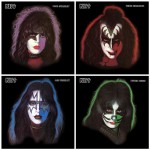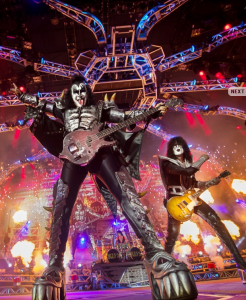Tim McPhate | KissFAQ
 KissFAQ has launched Back In The Solo Album Groove: The KISS Albums. 35 Years Later…, an ambitious multi-week retrospective dedicated to arguably the biggest milestone in KISStory: the 1978 KISS solo albums. Today, the site has published an interview with Larry Harris, the former executive vice president for Casablanca Records.
KissFAQ has launched Back In The Solo Album Groove: The KISS Albums. 35 Years Later…, an ambitious multi-week retrospective dedicated to arguably the biggest milestone in KISStory: the 1978 KISS solo albums. Today, the site has published an interview with Larry Harris, the former executive vice president for Casablanca Records.
The following are excerpts from Harris’ interview with KissFAQ’s Tim McPhate:
On the internal friction in the band:
KF: In doing some research, I came across an article in a May 1977 issue of “Billboard” in which Bill Aucoin mentioned the idea of the KISS members doing solo albums. And I also understand there was a proviso regarding solo albums in KISS’ record contract that was signed in late 1976. Larry, when do you recall the solo albums becoming a topic of conversation around the office?
LH: To be honest, I don’t remember the date, it was so long ago. It probably initially came up in typical conversation about when the next album would be. What I do remember, which I talk about in the book, was Howard Marks coming in — and Aucoin may have been there too — and telling us that the guys weren’t getting along very well. And possibly one way to get more product out in the street and stop them from breaking up would be solo albums.
KF: Yes, you mention that Bill Aucoin implied that the band would break up if the label refused to release four solo albums. Were the label’s hands essentially tied into going forward with the project?
LH: Well, it was either that or taking our only big rock act — because everybody else we had was either R&B, disco or comedy — that we started the label with and having them disintegrate. So we really had no choice in the matter if we wanted them or hoped that they would stay together.
On the gambling mentality of Neil Bogart:
KF: According to your book, Neil Bogart initially thought to release a total of 2 million solo albums, which equated to half a million for each album. But Howard Marks balked by quoting that KISS’ contract stipulated 1 million of each album needed to be pressed. I’m no lawyer, but if one solo album counted as half an album in the record contract, wouldn’t it be possible that pressing half the normal total would have been permissible?
LH: I have no idea. I don’t remember that saying that in the contract, or do I remember memorizing the contract 40 years ago (laughs). Neil was a gambler. And Neil felt if he was going to do this kind of investment — which was all that advertising per album — he was going to go for the throat. He wasn’t about to say, “I’m afraid to do it.” That wasn’t his style.
KF: Understood. But did Neil ever show any hesitance, maybe at the beginning?
LH: Howard Marks had a large influence on our company because he was a very smart guy and he helped Neil negotiate with KISS on a few levels when we were having some difficulties with them. Howard also made a fortune from KISS. From the $500,000 for each album in advertising, Howard wound up with 15 percent of that, aside form whatever else he was making with the band. So it behooved Howard for this to happen. I remember there was initially some reluctance about putting out four albums at one time and the cost involved but I think once Neil realized that it was either the group breaking up or this happening, he embraced it.
Continue reading →


 KissFAQ has launched Back In The Solo Album Groove: The KISS Albums. 35 Years Later…, an ambitious multi-week retrospective dedicated to arguably the biggest milestone in KISStory: the 1978 KISS solo albums. Today, the site has published an interview with Larry Harris, the former executive vice president for Casablanca Records.
KissFAQ has launched Back In The Solo Album Groove: The KISS Albums. 35 Years Later…, an ambitious multi-week retrospective dedicated to arguably the biggest milestone in KISStory: the 1978 KISS solo albums. Today, the site has published an interview with Larry Harris, the former executive vice president for Casablanca Records.